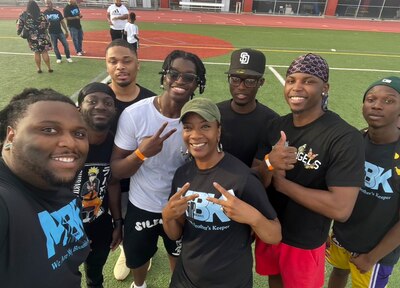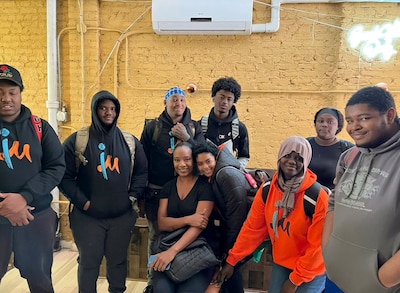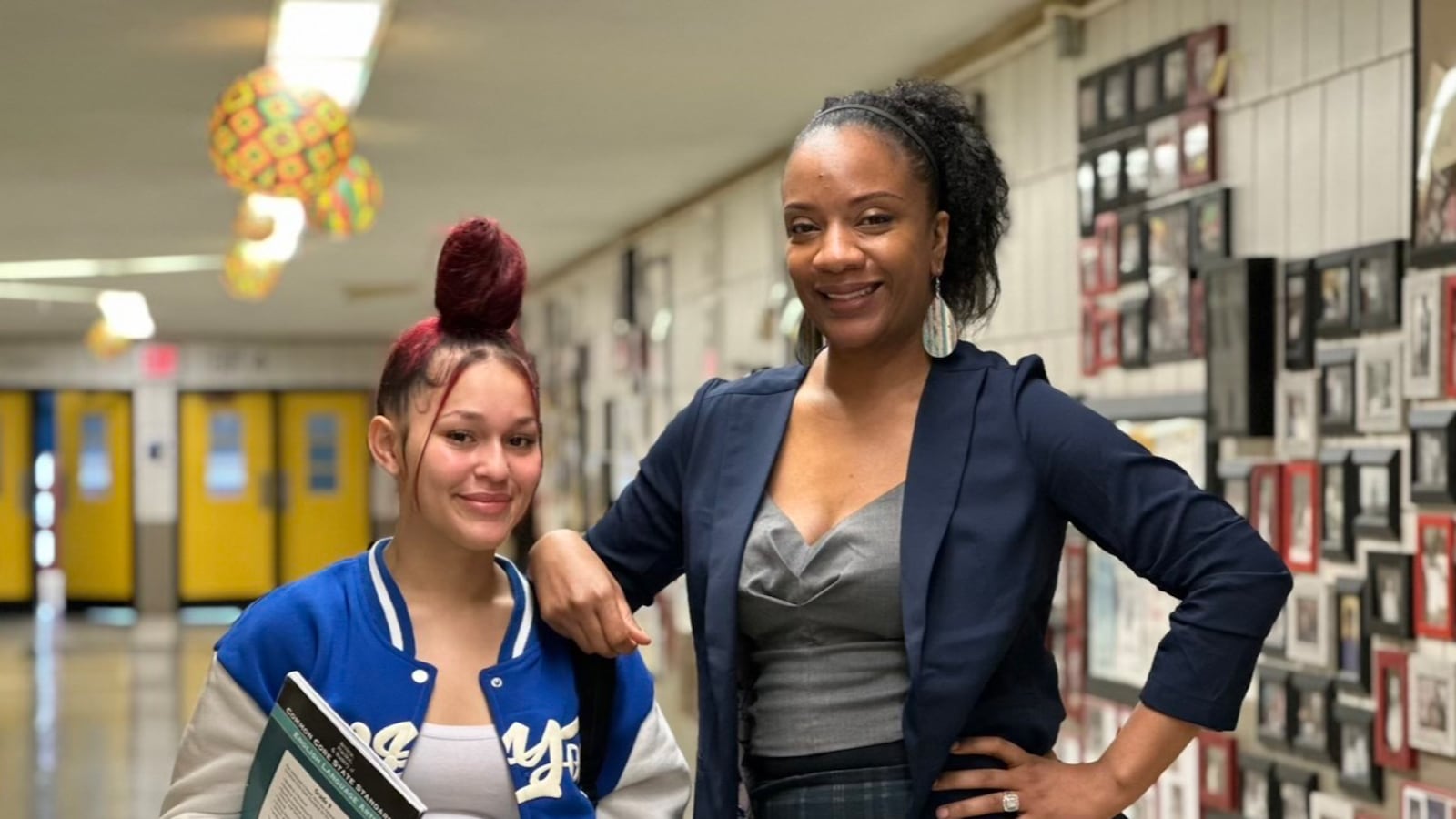Sign up for Chalkbeat New York’s free daily newsletter to keep up with NYC’s public schools.
For the bulk of last year, Jahlil Younger barely attended his Bedford-Stuyvesant high school.
The 18-year-old fell in with the wrong crowd and was struggling at his “second chance,” or transfer, school serving over-age and under-credited students that couldn’t make a go of it at other schools.
Things changed in the spring.
During the last few months of the academic year, Brooklyn High School for Leadership and Community Service started offering an after-school program run by Inspiring Minds NYC. The local nonprofit began the program late in the year because of a broken bureaucratic contracting system. But as soon as the program launched, it tapped into Younger’s interests. He took music, cooking, and a class about politics. Younger felt understood by the adults from the organization. He opened up about things that he never felt comfortable sharing before, like his recent decision to donate a kidney to his mom.
Suddenly, he felt like he had a reason to show up.
“I’m not gonna lie: Before this program started, I wasn’t coming to school. I’d be in the school every other day or every two days,” said Younger. “I was hanging out with … people who are gang-affiliated, who just came home from jail and are going back.”
For years, nonprofits like Inspiring Minds have been hurt by the city’s notoriously complicated and lengthy contract and procurement process. Several organizations, however, said things have gotten worse recently. The delays especially hurt businesses owned by women and people of color, like Inspiring Minds, which don’t have deep cash reserves to stay afloat. These are the same organizations that the city is trying to encourage to vie for more Education Department contracts.
Mayor Eric Adams and Comptroller Brad Lander created a joint task force that issued recommendations last year to tackle the contract backlog. But nonprofits have yet to see results. New York state Rep. Stephani Zinerman, of Brooklyn, told Chalkbeat she’s exploring legislation to address “our obligations to pay people in real time.”
According to an Education Department flow chart obtained by Chalkbeat, there’s a 15-step process that can take nine months to a year from when an organization learns it’s won a contract until the contract is registered with the comptroller’s office before payments can be made. But that timeline has stretched out, many organizations say. Contracts have been arriving late to the city’s Panel for Educational Policy, which must approve them before they can be registered for payment, officials in the comptroller’s office said.
If Inspiring Minds had been in place at the start of the year, how much more could the organization have helped Younger, wonders Katrena Perou, its executive director and a former basketball star at Penn State who has lived in Bed-Stuy for 20 years.
She also wonders how much it could have helped Brooklyn Leadership, which is currently in the state’s receivership program, giving the state control over the school until it meets specific benchmarks around its low graduation rates, high dropout rates, and behavioral challenges.

Some organizations are hurting more than others
Brooklyn Leadership is part of the city’s “community school” program, where nonprofits are embedded on campus to offer an array of services to students, their families, and educators during and after the school day. This full-service model has proven effective in New York City, according to research, and the federal government has ramped up support of such programs across the nation.
Perou’s organization was awarded an annual grant of $377,000 for two years to be the school’s lead community partner. The grant was supposed to take effect in July 2022, but Perou didn’t learn that she won it until March 2023 — nearly a year later. And the money could not be carried over to the following year.
Perou’s organization won grants to work with two other community schools, Manhattan’s Quest to Learn ($237,000 a year) and Brooklyn Collaborative Studies ($220,000 a year), but has not received the funds for more than a year and a half, she said. She finally received an interest-free bridge loan through a city program for nonprofits on Wednesday, which is supposed to help cover up to three months of payroll, rent, and other critical expenses.
And Perou has yet to receive this year’s money for Brooklyn Leadership. She had to turn to a local foundation as a stopgap measure.
Perou worries that organizations like hers, which are often from the communities they want to help, are at a breaking point. Her organization’s reserves are tapped. She’s looked into traditional loans, but high interest rates and other requirements often make things more difficult for many local programs run by women and people of color, she said.
Because of the payment delay, Inspiring Minds is offering fewer services than promised, fewer field trips, less mental health support and tutoring. Families at the schools often don’t even realize that their kids are missing out, she said.
“I’ve always been a big advocate for the organizations from and of the community having a chance to receive community school contracts,” said Perou, who started Inspiring Minds in 2019. “There’s a certain level of connection we can make [with the students] because we’re from the same space.”
She continued, “But the system needs to change so that more BIPOC organizations can compete for these contracts. It’s an equity issue and contradicts the mission of community schools.”
Many programs are struggling. Nearly 115 community schools, including Brooklyn Leadership, are funded through a $45 million pot of federal relief funds. The other two schools that Inspiring Minds won contracts for were through a federal 21st Century Community Learning Centers grant program, which is distributing $15 million to about 78 community schools working with 41 lead community organizations, according to city figures.
The Education Department has been working with community organizations to complete outstanding contract registrations and “disburse funds as quickly as possible,” said spokesperson Jenna Lyle, noting that the state’s notification of 21st Century grant recipients had been delayed, throwing off the timeline.
“Where possible, we have worked to expedite the process,” Lyle said. “We are working to ensure continuity of service despite delays.”
Contract system’s ‘glacial pace’ forces some to close doors
Some organization leaders told Chalkbeat they’ve had to take themselves off of payroll to ensure their employees get paid. One nonprofit leader said her organization bowed out after the first year of the community schools contract because of the payment delays.
“I’d rather walk away than put my company in that situation,” the organization’s head said, speaking on the condition of anonymity. “Because of the passion we have for the work, we allow certain things to be done. But passion doesn’t pay the bills and keep the lights on.”
The time it takes — from the submission to a request for proposal to contract approval to invoice — is “a glacial process,” said Terrance Winston, the executive director of the Coalition for Community Schools Excellence.
Contract delays have similarly hurt the prekindergarten sector, which is also largely run by women of color.
City officials have tried to make it “more nimble,” Winston said. “It’s just extremely challenging.”
Larger, more established nonprofits tend to be better situated to withstand the delayed payments and can “marshall their networks” for help, he said.
“For smaller organizations — those that more accurately reflect the population they serve — it’s more of a crisis situation.”
Moreover, many nonprofit organizations are dealing with problems on multiple fronts, he said. As they’re fighting to get paid, they’re facing wage increases to keep pace with the market and inflation as well as overhead cost increases. Meanwhile, they’re dealing with children whose issues, related to the trauma and grief from the pandemic, are more complicated than ever.
“Young people are still dealing with lost loved ones, learning loss, and other challenges of developing adolescents,” he said.

Brooklyn Leadership students see a change in their hallways
Perou estimated that last year’s contract delay for Brooklyn Leadership translated into the school’s community losing about $300,000 that would have gone to extended learning time for students, professional development for teachers on culturally responsive practices, and other services for families.
The program’s delay has real consequences for a school under scrutiny and with such a high-needs population. Many of its students live in temporary housing and many have been involved with the criminal justice system.
“I feel like there would have been less fights, less drama, less chaos,” said Emerald Carrion, 19, who has found a space through the program where she can express her emotions. She felt angrier last year, she said. She would slam doors around the school and hurl epithets at teachers, security guards, and other students.
Younger also said he was “constantly” getting in trouble last year.
“There was so much rage and violence. You could feel the negative energy in the hallways,” he said.
“This year, I’m a better me,” he added, crediting Inspiring Minds with not only transforming himself but the school community. Now, he’s looking forward to screening a documentary about his neighborhood of Brownsville that students filmed during an Inspiring Minds class. It focuses on positive aspects of the area to counter negative stereotypes. The music class he’s taking has also transformed his lyrics from negative to positive.
“I feel like we shouldn’t have had to wait so long,” Younger said.
Amy Zimmer is the bureau chief for Chalkbeat New York. Contact Amy at azimmer@chalkbeat.org.

